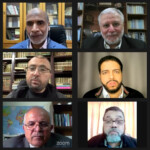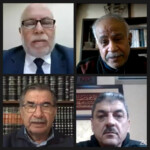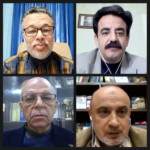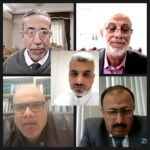A panel discussion expects the collapse of the ruling coalition in the Israeli government, Netanyahu’s implementation of Judaization plans, albeit in a less obvious form, via a circuitous route, and the escalation of struggle over the identity of al-Aqsa Mosque. The panel discussion was held by al-Zaytouna Centre for Studies and Consultations and Al-Quds International Institution, on 13/4/2023, with the participation of about seventy experts, researchers and specialists in the affairs of Palestine and the region.
Moderated by Prof. Dr. Mohsen Mohammad Saleh, the panel discussion included five papers that discussed the recent developments in the Israeli aggression against al-Aqsa, the escalation of the resistance and the possible tracks. The first paper was by the expert in Israeli affairs, Dr. Saleh al-Naami; the second was by the expert in Jerusalem affairs, Ziad Bhies; the third by the expert in Palestine affairs, Sari ‘Orabi; the fourth by the member of the Arab and Islamic Relations Office of Hamas, Usama Hamdan; and the fifth paper was by Prof. Dr. Walid ‘Abd al-Hay, the expert in futures studies. Fourteen researchers, scholars and specialists discussed the papers, with important interventions and questions, and the session was concluded by the answers and clarifications of the main panelists.
Many questions were asked at first about the composition of the Israeli government; the impact of having the far-right Religious Zionism party in it; the impact of the government platform on al-Aqsa and the holy sites; how would this government react in light of the Palestinian steadfastness and resistance, the Arab, Islamic and international reactions, and the reactions of the Israeli society itself? and how may the events evolve?
The panelists discussed how Israel’s aggression against al-Aqsa Mosque paved the way for changing the rules of engagement, and how Israel would respond. What are the strategic and political risks of having confrontations on multiple fronts, and where would Israel strike in response, is it Lebanon, Syria, Iran, the resistance inside Palestine or outside it?
The panelists discussed the possible scenarios concerning Netanyahu’s Judaization plans: The Judaization of al-Aqsa and others would continue, using explicit violence; the Judaization plans would continue via a circuitous route; the government would gradually back off from its plans; or it would completely halt it. They defined six variables that would make a scenario more likely: An Israeli civil war due to differences over judicial amendments; how the Palestinian resistance would be confronted; the collapse of the ruling coalition, and the call for new elections; the escalation of resistance and the outbreak of a regional war; concerns about an official and public Arab reaction, especially in the countries that normalized their relations with Israel; and the international official and public reactions.
The experts also discussed the rise of Religious Zionism, which changed the nature of the Israeli state as a settler-colonial project of population replacement. It used to be content with occupying the land and replacing population, however, now it wants to replace religious holy sites, including but not limited to al-Aqsa Mosque, which is now the main target. Over the past five year, the overlap of Ramadan with major Jewish holidays have paved the way to the targeting of al-Aqsa Mosque, which became at the heart of the conflict and a definitive trigger for escalation. Furthermore, the Israeli use of force to prevent worshipers from performing I‘tikaf (an Islamic practice of spending a few days inside a mosque during Ramadan), led the confrontations to spiral out into clashes with the resistance in Gaza Strip (GS), Lebanon, Golan and the West Bank (WB).
The panelists saw that the resistance took a step ahead of Israel, by launching missiles from southern Lebanon and the Golan Heights, and the escalation of resistance in WB, thus weakening Israel’s position and thwarting the attempts of the Israeli government to impose a new equation.
The panel discussion concluded that the possibility of the collapse of the ruling coalition in the Israeli government is more likely, followed by the possibility of calling for new elections. Netanyahu would implement the Judaization plans via a circuitous route; try to find a way out for the judicial amendments and ensure that they do not affect the Judaization policy and the cohesion of the home front; and work on absorbing the Arab, international and Palestinian reactions through a gradual Judaization, especially by having time intervals between each step. The panelists expect Israel to avoid any confrontations with Hizbullah, while it may target Hamas in GS to show the Israeli public that it has achieved victory and restored deterrence.
As for al-Aqsa Mosque, the panelists expect that the struggle over the identity of the Mosque would continue; the Israeli retreats would relatively affect the cohesion of the ruling coalition and the rise of Religious Zionism; and that the Religious Zionism would encourage a militia-like behavior against the Palestinians, the land and the holy sites, particularly Jerusalem and al-Aqsa Mosque.
The discussants recommended strengthening the centrality of Jerusalem in plans and discourses, encouraging Islamic mobilization to support al-Aqsa Mosque and involving more Muslim scholars in this issue. They suggested using the issue of al-Aqsa Mosque to forge real reconciliations in the region, on the bases that all sides have the same enemy and share the same destiny, and saw that the popular resistance in Jerusalem and WB must be supported, thus blocking the Israeli attempts to single out the resistance.
The participants also recommended strengthening the resistance outside al-Aqsa Mosque region, whether on the Palestinian, Arab, Islamic or international levels, which increases the chances of defeating Israel. The resistance forces in the region must coordinate and cooperate more, for this is an opportunity for the resistance to make an important breakthrough in the conflict with the Israeli occupation. The participants also saw that the resistance in WB must restore its strength to be able to thwart Israeli plans.
Al-Zaytouna Centre for Studies and Consultations, 14/4/2023








Leave A Comment